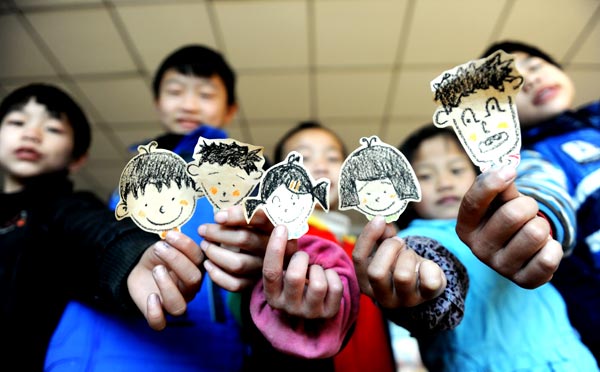 |
| AIDS orphans, who contracted HIV from their mothers, are happy with their new home founded by Fuyang AIDS Orphan Salvation Association in Anhui province. (Xinhua/ Liu Junxi) |
Medical programs are helping HIV-infected women give birth to healthy babies. Liu Zhihua investigates the challenges facing these new mothers and their families.
Holding her 1-year-old daughter in her arms, 20-year-old Xiao Mei is all smiles. The baby girl is the only child free from HIV/AIDS in her family of four in Zhumadian, Henan province, thanks to a government-subsidized program that provides pregnant women with free treatment to block mother-to-child transmission. "I cannot express in words how happy I feel now," Xiao says. "I always wanted a baby, but was extremely worried that I would give HIV to the child."
Xiao was infected from a blood transfusion as a young child. Her husband, also 20, was born with HIV, and his father died from AIDS.
They enrolled in a local mother-to-child transmission block program when they decided to have a child. Two HIV tests on the baby have both been negative.
Numerous families have benefited from such a program.
China is estimated to have 780,000 people living with HIV/AIDS, among which the ratio of women jumped from 15.3 percent in 1998 to 28.6 percent in 2012, and most of them were of reproductive age, according to Guo Ruixiang, a China Program Officer with UN Women.
Since Chinese health authorities issued guidelines to prevent mother-to-child transmission in 2001, many national and provincial programs that provide free intervention have been initiated.
"In 2012, only 7.1 percent of newborns born to HIV-positive women were confirmed to get HIV from their mothers, and roughly 4,500 children avoided getting HIV infection since 2001," says Wang Fang, an HIV/AIDS control specialist with the National Center for Women and Children's Health.

 Heavy cargo flights taking off
Heavy cargo flights taking off In pictures: PLA's digital equipment
In pictures: PLA's digital equipment  Americans mark Thanksgiving Day with parades
Americans mark Thanksgiving Day with parades Self-made farmer billionaire donates 69 villas at hometown
Self-made farmer billionaire donates 69 villas at hometown Demolition of bizarre rooftop villa in Beijing still in progress
Demolition of bizarre rooftop villa in Beijing still in progress Service seminar for E China train attendants
Service seminar for E China train attendants  China's first nude photographer
China's first nude photographer Selected sports photos of the week
Selected sports photos of the week Treasure of Chinese culture- Nuo Dance
Treasure of Chinese culture- Nuo Dance  Youths in Night club: photo story
Youths in Night club: photo story Models dazzle at Int'l Yacht Model Pageant
Models dazzle at Int'l Yacht Model Pageant  Crystal scenery in China: Jilin fog glaze
Crystal scenery in China: Jilin fog glaze  Tianjin holds first pole dance championship
Tianjin holds first pole dance championship  Annual Santa Claus parade held in Canada's Montreal
Annual Santa Claus parade held in Canada's Montreal China's aircraft carrier passes through Taiwan Strait
China's aircraft carrier passes through Taiwan StraitDay|Week|Month